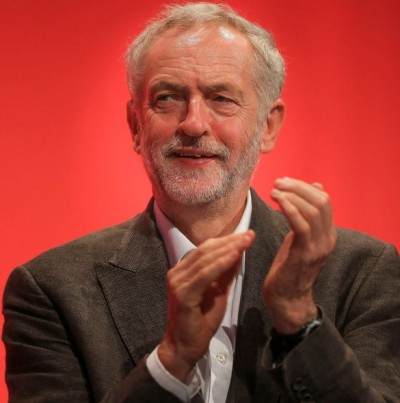Re-Electing Jeremy Corbyn: The Triumph of Momentum

He has proven to be one of the most stubborn of creatures in a political sense. Unlike the dinosaur of political thinking he has been accused of being, British Labour’s Jeremy Corbyn continues to survive the meteorites, and more nuanced weapons, directed at him.
The initial strategy from Labour MPs was to oust their leader in July on procedural grounds. The mutineers (call them the Tories in Labour clothing, the Blairites) failed to get their wishes of disqualifying Corbyn from office by a narrow 18-14 ruling by the National Executive Committee that Corbyn be allowed on the ballot even without the endorsement of 20 percent of his MPs.[1]
Instead of limping away in defeat from contender Owen Smith, Corbyn strengthened his position to be, interestingly enough, Labour’s strongest leader on paper to have ever been elected.
Even prior to Corbyn’s triumph, Smith was nervous at not having the numbers for unseating the Labour leader, suggesting, in an open letter to Labour Party members and supporters that his ideas would remain “as relevant after this contest as they have been during.” When loss is assured, best focus on the non-corporeal aspect of a losing performance.
Corbyn’s numbers proved thumping in their dimensions. There were 500,000 who flocked to the polls, and of those, 61.8 percent went Corbyn’s way, up from the 59.5 percent he garnered in September 2015. Had 130,000 party members not been deemed ineligible, the victory would have been an even greater massacre of his rival.
Detractors feel a gloomy similarity with previous Labour leaders liked for their resolve and manner but feared for their suicidal streak before ruthless conservative governments worshiping before the market altar. “Our policies,” claimed Vernon Coaker in a typical view of that situation, “have to change. If we don’t change we will die.”
For all that, Corbyn and his movement are more alive than ever, having little desire to expire. He is very much a manifestation of tide and force, a reminder that the Zeitgeist at the moment favours suspicion of central powers divorced from human sentiment. The bureaucrats and party hacks are not in vogue.
Central to that is a good smattering of good old decent socialism that had been much maligned by Tony Blair’s own surgical, and bewitching efforts. Knowing this to be the case, Smith was always struggling to remind voters within the party that Corbyn did not have a monopoly on the socialist creed.
The machine men and women are the robots to be feared and, more directly, ignored. Deputy leader Tom Watson has been accused of being a “Witchfinder” while past leaders such as Neil (“Lord Kneel”) Kinnock have been reminded of their supposedly perfidious past to workers.
Manufactured in the New Labour hot house of stated reform, the Blairites have begun to rust before the vengeful Corbynistas in the Momentum movement. Their presence is such as to land suggestions of a “personality cult” in the making.
The irony now is that Corbyn, in an effort to avoid another disruption, will attempt to appoint his own shadow cabinet with minimum influence of the MPs within his own party. This will also give him a shot at having better control over the National Executive Committee, which has not always been friendly to his efforts.
Swimming on the tide of popularity, any resistance was bound to look foolish, though it refuses to abate. Individuals like Wes Streeting MP told those at a gathering that, “We the people in this room, and across our party cannot surrender to a political tradition that will keep this party in opposition for generations to come.”[2]
Individuals such as Iain McNicol, the Labour General Secretary, show the gap between the Corbyn movement and party managerialism that emphasises “clause one socialism”. Parliamentary presence was one thing, the grass roots, with a revived socialist sentiment, quite another.
Former Shadow Health Secretary, Heidi Alexander, who has been niggling and sceptical of Corbyn, only had electioneering, and conservative styled appeal electioneering at that, on the brain. “What people like me are determined to do is continue fighting for a Labour Party that speaks to and for the whole of the country, and one which is capable of winning the next general election.”
The newly re-crowned leader has also threatened a certain number of de-selections for Labour MPs, and promised to shift the focus on policy making to the lower echelons of the party. Such a method, in one sense, is an attempt to draw out and marginalize his detractors.
The revenge of history on the New Labour movement is nigh. Each time an effort it made to target Corbyn’s leadership, the party receives a boost in membership. (There were 15,500 additions the immediate aftermath of his victory.)
Corbyn, even if he is not successful at the next election, has already made his mark on his party by localising interest at the branch level rather than that of the focus group, becoming something of an avenging angel. This is the social democratic agenda in action, though whether the British voter will give him a chance is another story.
The managers will be terrified, as much for their jobs as indeed for the party. If nothing else, Corbyn will have created something distinct from the Labour-Tory formula that characterised the Blair years.
Dr. Binoy Kampmark was a Commonwealth Scholar at Selwyn College, Cambridge. He lectures at RMIT University, Melbourne. Email: [email protected]
Notes
[1] https://www.neweurope.eu/

